外研版英语七年级上册Module 4 Unit 2 Is your food and drink healthy?单词讲解课件+嵌入单词音频(共38张PPT)
文档属性
| 名称 | 外研版英语七年级上册Module 4 Unit 2 Is your food and drink healthy?单词讲解课件+嵌入单词音频(共38张PPT) | 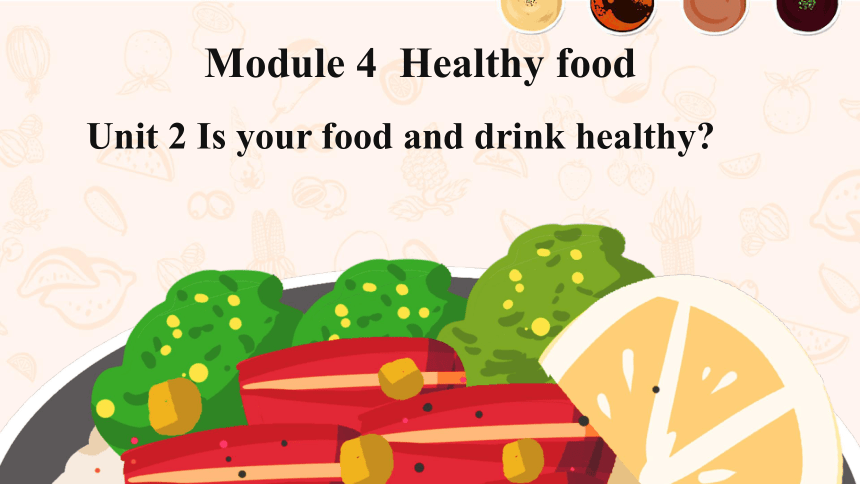 | |
| 格式 | zip | ||
| 文件大小 | 21.8MB | ||
| 资源类型 | 教案 | ||
| 版本资源 | 外研版 | ||
| 科目 | 英语 | ||
| 更新时间 | 2021-12-16 13:49:49 | ||
图片预览

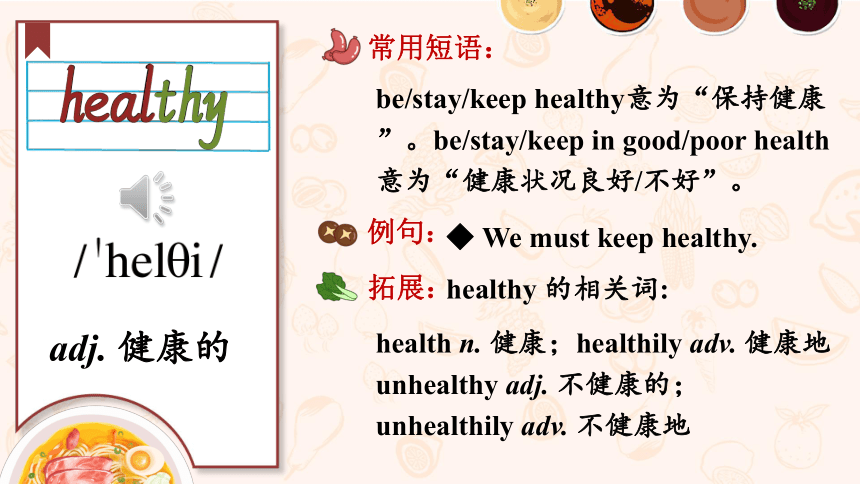
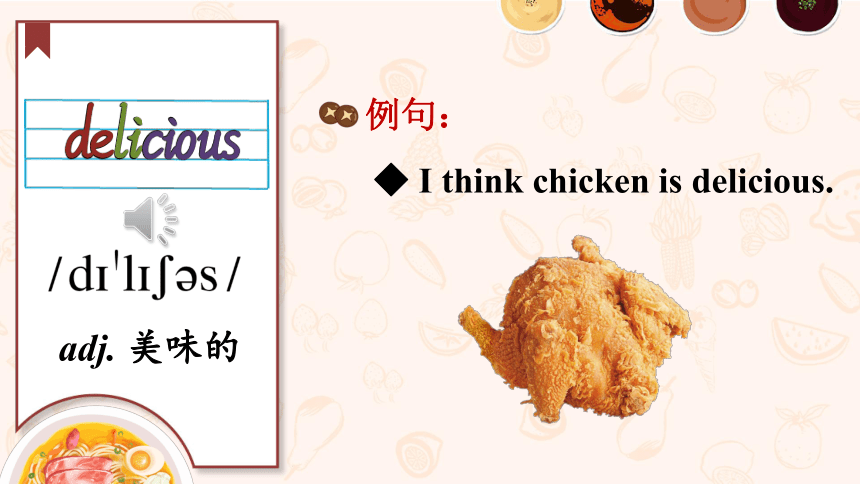
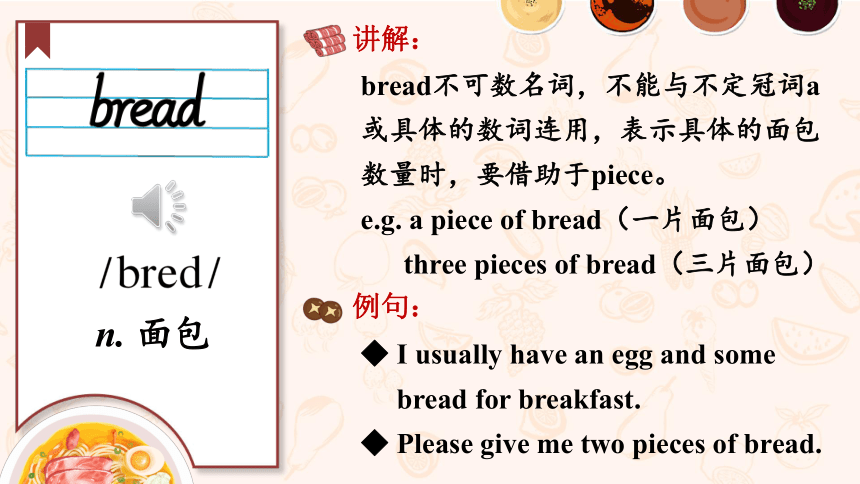
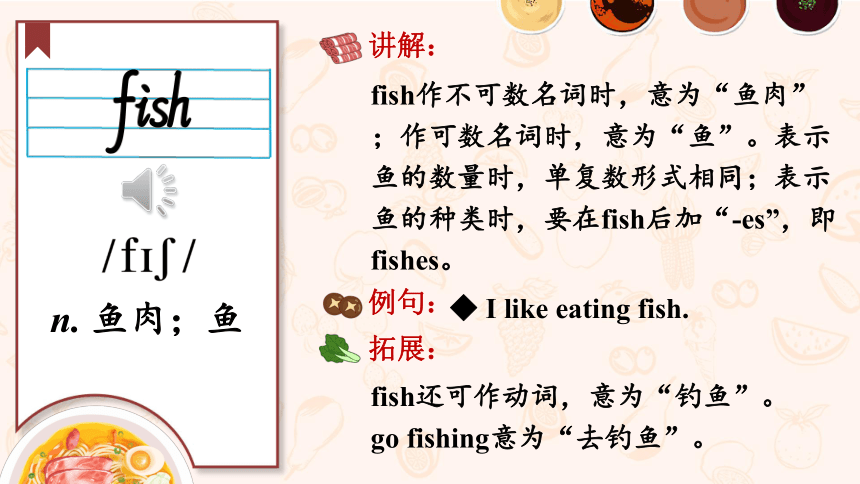
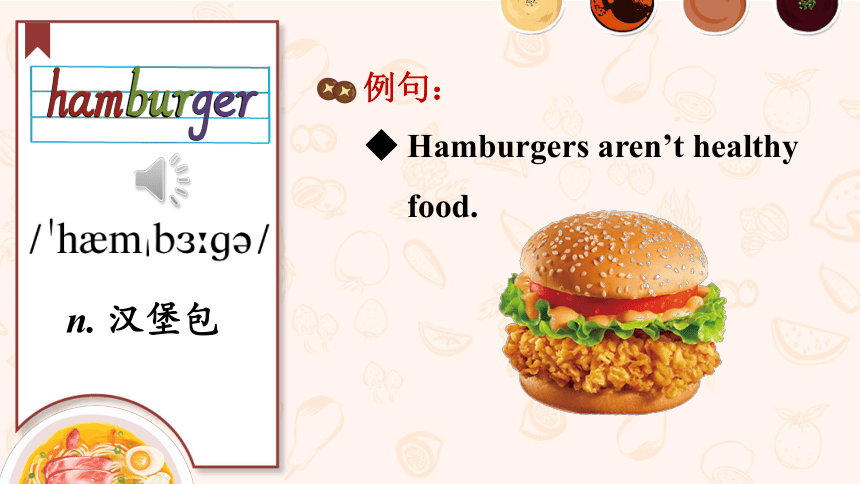
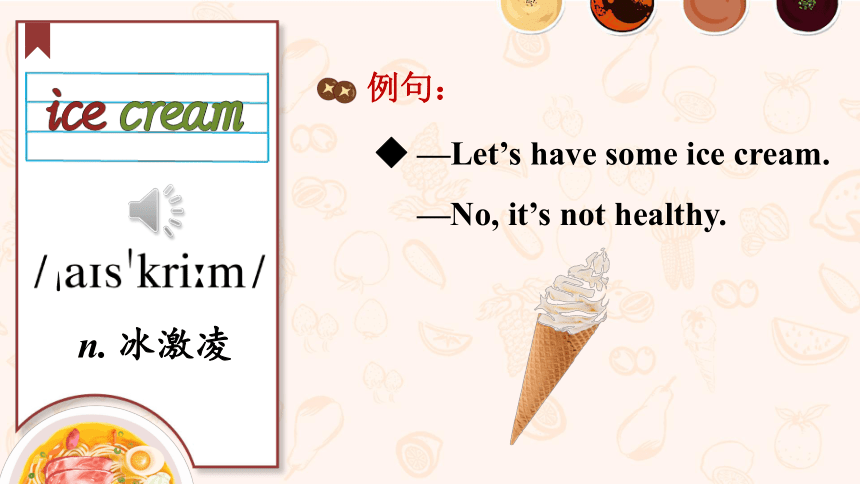
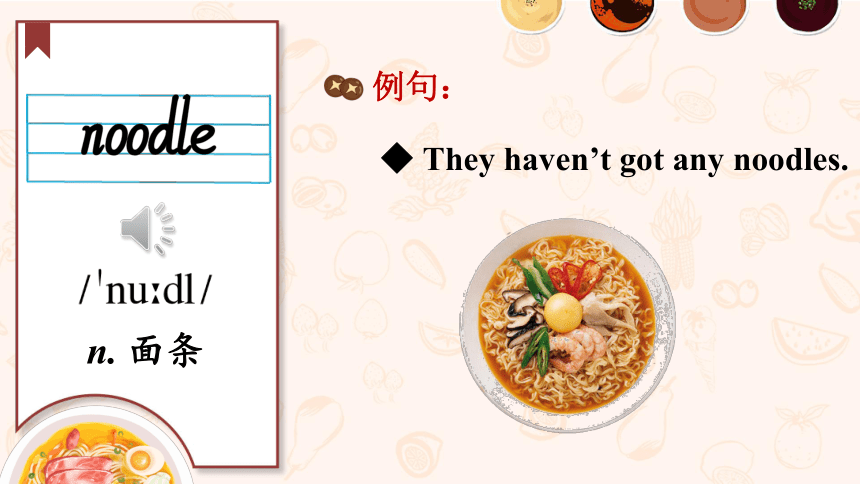
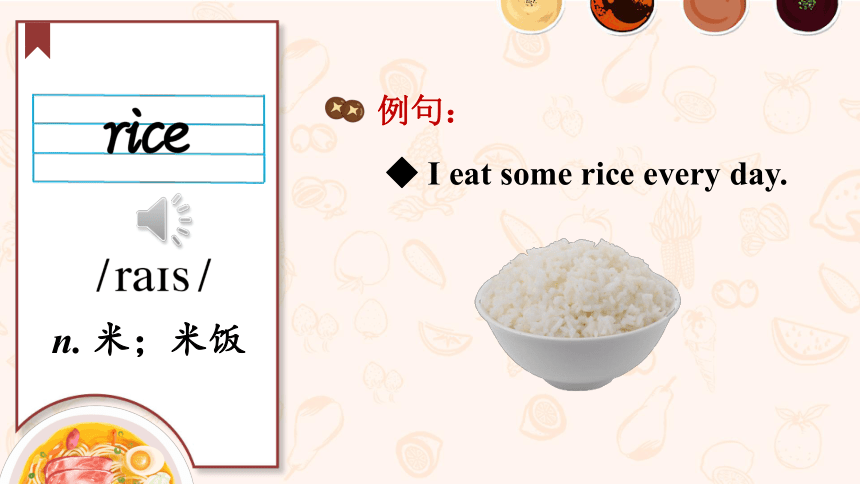
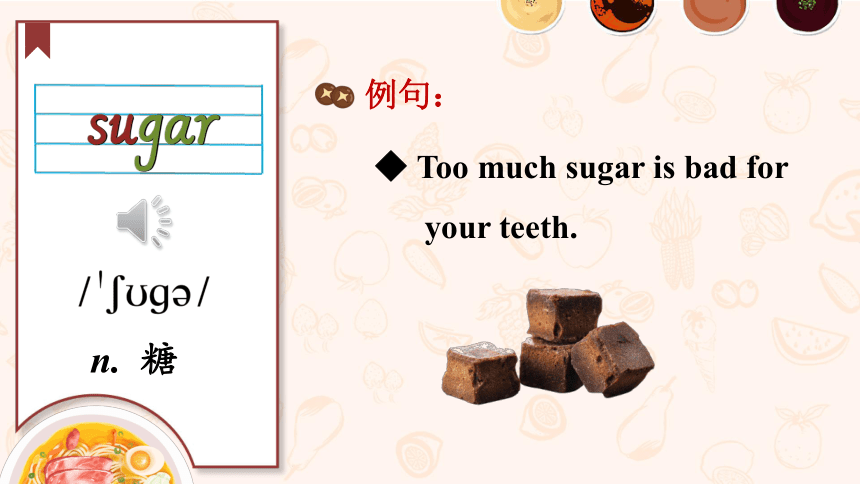
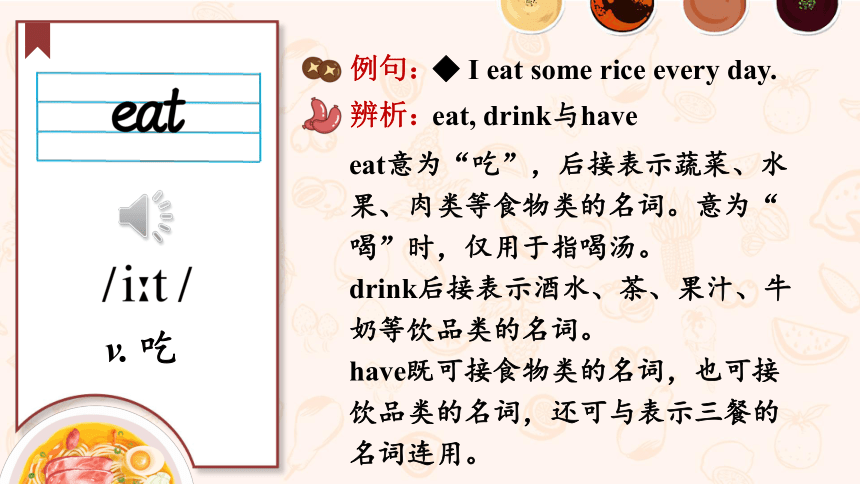
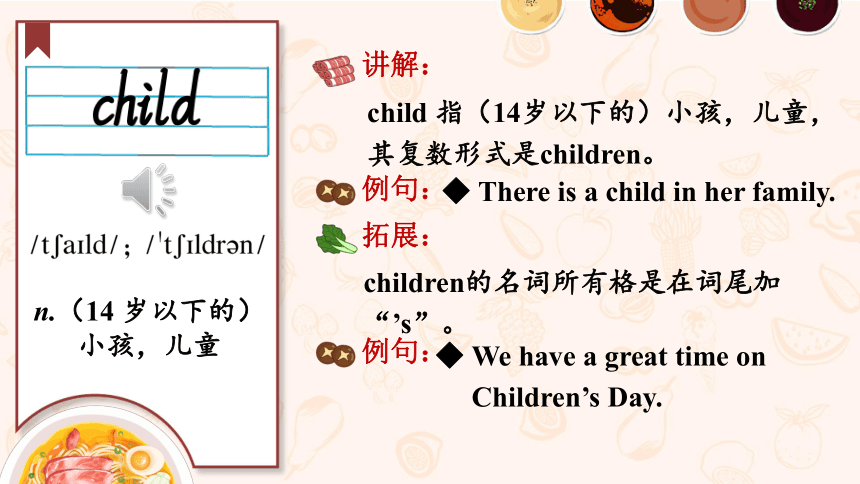
文档简介
(共38张PPT)
Module 4 Healthy food
Unit 2 Is your food and drink healthy
例句:
be/stay/keep healthy意为“保持健康”。be/stay/keep in good/poor health意为“健康状况良好/不好”。
◆ We must keep healthy.
health n. 健康;healthily adv. 健康地
unhealthy adj. 不健康的;
unhealthily adv. 不健康地
拓展:
常用短语:
adj. 健康的
healthy 的相关词:
例句:
◆ I think chicken is delicious.
adj. 美味的
例句:
bread不可数名词,不能与不定冠词a或具体的数词连用,表示具体的面包数量时,要借助于piece。
e.g. a piece of bread(一片面包)
three pieces of bread(三片面包)
◆ I usually have an egg and some
bread for breakfast.
◆ Please give me two pieces of bread.
讲解:
n. 面包
例句:
fish作不可数名词时,意为“鱼肉”;作可数名词时,意为“鱼”。表示鱼的数量时,单复数形式相同;表示鱼的种类时,要在fish后加“-es”,即fishes。
◆ I like eating fish.
fish还可作动词,意为“钓鱼”。go fishing意为“去钓鱼”。
拓展:
讲解:
n. 鱼肉;鱼
例句:
◆ Hamburgers aren’t healthy
food.
n. 汉堡包
例句:
◆ —Let’s have some ice cream.
—No, it’s not healthy.
n. 冰激凌
例句:
◆ They haven’t got any noodles.
n. 面条
例句:
◆ I eat some rice every day.
n. 米;米饭
例句:
◆ Too much sugar is bad for
your teeth.
n. 糖
例句:
◆ I eat some rice every day.
eat意为“吃”,后接表示蔬菜、水果、肉类等食物类的名词。意为“喝”时,仅用于指喝汤。
drink后接表示酒水、茶、果汁、牛奶等饮品类的名词。
have既可接食物类的名词,也可接饮品类的名词,还可与表示三餐的名词连用。
辨析:
v. 吃
eat, drink与have
例句:
child 指(14岁以下的)小孩,儿童,其复数形式是children。
◆ There is a child in her family.
children的名词所有格是在词尾加“’s”。
拓展:
讲解:
n.(14 岁以下的)小孩,儿童
例句:
◆ We have a great time on
Children’s Day.
串记:
其反义短语为be bad for,意为“对……有害的”。
◆ Eating fruit is good for you and
drinking too much cola is bad for you.
(1) be good at 意为“擅长”,相当于do
well in。
(2) be good to意为“对……友好”。
(3) be good with意为“善于应对……”。
拓展:
讲解:
对……有帮助的
例句:
sweet作形容词,意为“甜的”。
◆ Sugar is sweet.
sweet还可作可数名词,意为“糖果”,是糖果的总称,其复数形式是sweets。
拓展:
讲解:
adj. 甜的
例句:
◆ There are lots of sweets at the party.
例句:
◆ Smoking is bad for your
health.
对……有害的
其反义短语为be good for,意为“对……有帮助的”。
讲解:
常见短语:
all right意为“好的,行,可以”,用于表示同意别人的意见、建议、安排或命令等。
adj. 正确的,对的
例句:
◆ —How about some beef
—All right.
(1) 用于问候别人或回答别人的问候。
(2) 用于征求对方的意见或请求对方的
许可。
拓展:
all right的其他常见用法如下
例句:
拓展:
常用短语:
讲解:
图解:
串记:
巧记:
例句:
◆ She usually has eggs and some
porridge(粥)for breakfast.
n. 蛋;鸡蛋
例句:
◆ We always do eye exercises
between classes.
n. 眼睛
例句:
◆ Milk, cheese and fish are
good for your teeth.
n. 奶酪
例句:
tooth可数名词,意为“牙齿”,其复数形式是teeth。brush one’s teeth意为“刷牙”;have a sweet tooth意为“喜欢吃甜食”。
◆ The baby has got two teeth.
与tooth变复数方法类似的名词还有foot→feet脚;goose→geese鹅。
拓展:
常用短语:
n. 牙齿
例句:
◆ Many people here like the
milk with a bit of sugar.
n. 一点儿;少许
例句:
a bit与a little
◆ It is a bit cold in the morning in
spring.
a bit与a little都可修饰形容词、副词或动词(短语)。
a bit修饰不可数名词时要用a bit of;
a little可直接修饰不可数名词。
辨析:
讲解:
稍微;有点儿
a bit用来修饰形容词、副词或动词(短语),表示程度。
例句:
常用来说明或修饰人。常与be动词或look, feel, get等系动词连用。be tired of 意为“对……厌烦”。
◆ Mr Lin is tired after work.
tiring是形容词,意为“累人的;令人疲倦的”,常用来说明或修饰物。
拓展:
讲解:
adj. 劳累的
例句:
◆ You can’t have the fish soup
now. It’s too hot.
n. 汤
例句:
在句中作定语或表语。常用句型“It is important (for sb.) to do sth.”意为“做某事(对某人来说)是重要的”。
◆ English is an important subject.
important 的名词形式是importance,意为“重要性”。
拓展:
讲解:
adj. 重要的
例句:
其反义词是forget,意为“忘记”。
remember to do sth.
记得要做某事(事情还未做)remember doing sth.
记得做过某事(事情已经做了)
◆ I can’t remember her telephone
number.
◆ Remember to call me when you
get there.
讲解:
v. 记住;想起
例句:
eat well 意为“吃得好”,well修饰动词eat。
◆ Can you draw the horse well
well作副词,意为“好地”,修饰行为动词,位于其后。作形容词,意为“健康的;身体好的”,位于连系动词后作表语。
good作形容词,意为“好的”,可作定语或表语。
辨析:
短语:
adv. 好地
well与good
例句:
stay作系动词,意为“保持”,后接形容词作表语,如stay open(开着); stay quiet(保持安静);stay healthy意为“保持健康”。
◆ We eat vegetables and fruit to stay healthy.
stay还可作行为动词,意为“停留;待”。
拓展:
讲解:
v. 保持;停留
例句:
◆ It is important to remember:
eat well, stay healthy, and
don’t get fat!
adj. 肥胖的
例句:
get 作系动词,意为“变得”,后接形容词作表语。fat是形容词,意为“肥胖的”,其反义词为thin,意为“瘦的”。
◆ My aunt doesn’t play sports, so
she gets fat.
讲解:
发胖
例句:
表示在两者或两者以上中选择其一。or连接多个主语时,谓语动词的数要与最近的主语保持一致。
◆ We have bread or hamburgers for
breakfast.
or作连词,还可意为“也不”,常用在否定句中,否定两个或两个以上的并列成分。
拓展:
讲解:
conj. 或者
例句:
breakfast与lunch和dinner一起组成“一日三餐”。常用短语如下:
at breakfast 早饭时
have breakfast 吃早饭
have… for breakfast 早饭吃……
◆ What do you have for breakfast
讲解:
n. 早饭
例句:
every其后接可数名词单数。
◆ Tom has breakfast at 7:00
every morning.
every构成的合成词有:
everyone(每个人),
everything(一切),
everywhere(到处;处处), everybody(每个人)。
拓展:
讲解:
adj. 每个,每一
例句:
◆ Jack always has lunch at home.
(表示三餐的名词前没有形容词修饰时,通常不加冠词)
n. 午饭
lunch与breakfast和dinner一起组成“一日三餐”。常用短语如下:
at lunch 午饭时
have lunch 吃午饭
have… for lunch 午饭吃……
讲解:
例句:
◆ He is at home on Sunday.
n. 家;家庭
例句:
◆ Let’s have a big dinner.
(表示三餐的名词前有形容词修饰时,通常要加不定冠词a/an。)
n. 晚饭;正餐
dinner与breakfast和lunch一起组成“一日三餐”。常用短语如下:
at dinner 晚饭时
have dinner 吃晚饭
have… for dinner 晚饭吃……
讲解:
例句:
◆ There is an orange and some
bananas on the desk.
n. 香蕉
例句:
其反义词是sell,意为“卖”。
常见用法如下:
buy sb. sth.=buy sth. for sb.
为某人买某物
buy… from… 从……买……
◆ Let’s go and buy her some bread.
=Let’s go and buy some bread for her.
讲解:
v. 买
Module 4 Healthy food
Unit 2 Is your food and drink healthy
例句:
be/stay/keep healthy意为“保持健康”。be/stay/keep in good/poor health意为“健康状况良好/不好”。
◆ We must keep healthy.
health n. 健康;healthily adv. 健康地
unhealthy adj. 不健康的;
unhealthily adv. 不健康地
拓展:
常用短语:
adj. 健康的
healthy 的相关词:
例句:
◆ I think chicken is delicious.
adj. 美味的
例句:
bread不可数名词,不能与不定冠词a或具体的数词连用,表示具体的面包数量时,要借助于piece。
e.g. a piece of bread(一片面包)
three pieces of bread(三片面包)
◆ I usually have an egg and some
bread for breakfast.
◆ Please give me two pieces of bread.
讲解:
n. 面包
例句:
fish作不可数名词时,意为“鱼肉”;作可数名词时,意为“鱼”。表示鱼的数量时,单复数形式相同;表示鱼的种类时,要在fish后加“-es”,即fishes。
◆ I like eating fish.
fish还可作动词,意为“钓鱼”。go fishing意为“去钓鱼”。
拓展:
讲解:
n. 鱼肉;鱼
例句:
◆ Hamburgers aren’t healthy
food.
n. 汉堡包
例句:
◆ —Let’s have some ice cream.
—No, it’s not healthy.
n. 冰激凌
例句:
◆ They haven’t got any noodles.
n. 面条
例句:
◆ I eat some rice every day.
n. 米;米饭
例句:
◆ Too much sugar is bad for
your teeth.
n. 糖
例句:
◆ I eat some rice every day.
eat意为“吃”,后接表示蔬菜、水果、肉类等食物类的名词。意为“喝”时,仅用于指喝汤。
drink后接表示酒水、茶、果汁、牛奶等饮品类的名词。
have既可接食物类的名词,也可接饮品类的名词,还可与表示三餐的名词连用。
辨析:
v. 吃
eat, drink与have
例句:
child 指(14岁以下的)小孩,儿童,其复数形式是children。
◆ There is a child in her family.
children的名词所有格是在词尾加“’s”。
拓展:
讲解:
n.(14 岁以下的)小孩,儿童
例句:
◆ We have a great time on
Children’s Day.
串记:
其反义短语为be bad for,意为“对……有害的”。
◆ Eating fruit is good for you and
drinking too much cola is bad for you.
(1) be good at 意为“擅长”,相当于do
well in。
(2) be good to意为“对……友好”。
(3) be good with意为“善于应对……”。
拓展:
讲解:
对……有帮助的
例句:
sweet作形容词,意为“甜的”。
◆ Sugar is sweet.
sweet还可作可数名词,意为“糖果”,是糖果的总称,其复数形式是sweets。
拓展:
讲解:
adj. 甜的
例句:
◆ There are lots of sweets at the party.
例句:
◆ Smoking is bad for your
health.
对……有害的
其反义短语为be good for,意为“对……有帮助的”。
讲解:
常见短语:
all right意为“好的,行,可以”,用于表示同意别人的意见、建议、安排或命令等。
adj. 正确的,对的
例句:
◆ —How about some beef
—All right.
(1) 用于问候别人或回答别人的问候。
(2) 用于征求对方的意见或请求对方的
许可。
拓展:
all right的其他常见用法如下
例句:
拓展:
常用短语:
讲解:
图解:
串记:
巧记:
例句:
◆ She usually has eggs and some
porridge(粥)for breakfast.
n. 蛋;鸡蛋
例句:
◆ We always do eye exercises
between classes.
n. 眼睛
例句:
◆ Milk, cheese and fish are
good for your teeth.
n. 奶酪
例句:
tooth可数名词,意为“牙齿”,其复数形式是teeth。brush one’s teeth意为“刷牙”;have a sweet tooth意为“喜欢吃甜食”。
◆ The baby has got two teeth.
与tooth变复数方法类似的名词还有foot→feet脚;goose→geese鹅。
拓展:
常用短语:
n. 牙齿
例句:
◆ Many people here like the
milk with a bit of sugar.
n. 一点儿;少许
例句:
a bit与a little
◆ It is a bit cold in the morning in
spring.
a bit与a little都可修饰形容词、副词或动词(短语)。
a bit修饰不可数名词时要用a bit of;
a little可直接修饰不可数名词。
辨析:
讲解:
稍微;有点儿
a bit用来修饰形容词、副词或动词(短语),表示程度。
例句:
常用来说明或修饰人。常与be动词或look, feel, get等系动词连用。be tired of 意为“对……厌烦”。
◆ Mr Lin is tired after work.
tiring是形容词,意为“累人的;令人疲倦的”,常用来说明或修饰物。
拓展:
讲解:
adj. 劳累的
例句:
◆ You can’t have the fish soup
now. It’s too hot.
n. 汤
例句:
在句中作定语或表语。常用句型“It is important (for sb.) to do sth.”意为“做某事(对某人来说)是重要的”。
◆ English is an important subject.
important 的名词形式是importance,意为“重要性”。
拓展:
讲解:
adj. 重要的
例句:
其反义词是forget,意为“忘记”。
remember to do sth.
记得要做某事(事情还未做)remember doing sth.
记得做过某事(事情已经做了)
◆ I can’t remember her telephone
number.
◆ Remember to call me when you
get there.
讲解:
v. 记住;想起
例句:
eat well 意为“吃得好”,well修饰动词eat。
◆ Can you draw the horse well
well作副词,意为“好地”,修饰行为动词,位于其后。作形容词,意为“健康的;身体好的”,位于连系动词后作表语。
good作形容词,意为“好的”,可作定语或表语。
辨析:
短语:
adv. 好地
well与good
例句:
stay作系动词,意为“保持”,后接形容词作表语,如stay open(开着); stay quiet(保持安静);stay healthy意为“保持健康”。
◆ We eat vegetables and fruit to stay healthy.
stay还可作行为动词,意为“停留;待”。
拓展:
讲解:
v. 保持;停留
例句:
◆ It is important to remember:
eat well, stay healthy, and
don’t get fat!
adj. 肥胖的
例句:
get 作系动词,意为“变得”,后接形容词作表语。fat是形容词,意为“肥胖的”,其反义词为thin,意为“瘦的”。
◆ My aunt doesn’t play sports, so
she gets fat.
讲解:
发胖
例句:
表示在两者或两者以上中选择其一。or连接多个主语时,谓语动词的数要与最近的主语保持一致。
◆ We have bread or hamburgers for
breakfast.
or作连词,还可意为“也不”,常用在否定句中,否定两个或两个以上的并列成分。
拓展:
讲解:
conj. 或者
例句:
breakfast与lunch和dinner一起组成“一日三餐”。常用短语如下:
at breakfast 早饭时
have breakfast 吃早饭
have… for breakfast 早饭吃……
◆ What do you have for breakfast
讲解:
n. 早饭
例句:
every其后接可数名词单数。
◆ Tom has breakfast at 7:00
every morning.
every构成的合成词有:
everyone(每个人),
everything(一切),
everywhere(到处;处处), everybody(每个人)。
拓展:
讲解:
adj. 每个,每一
例句:
◆ Jack always has lunch at home.
(表示三餐的名词前没有形容词修饰时,通常不加冠词)
n. 午饭
lunch与breakfast和dinner一起组成“一日三餐”。常用短语如下:
at lunch 午饭时
have lunch 吃午饭
have… for lunch 午饭吃……
讲解:
例句:
◆ He is at home on Sunday.
n. 家;家庭
例句:
◆ Let’s have a big dinner.
(表示三餐的名词前有形容词修饰时,通常要加不定冠词a/an。)
n. 晚饭;正餐
dinner与breakfast和lunch一起组成“一日三餐”。常用短语如下:
at dinner 晚饭时
have dinner 吃晚饭
have… for dinner 晚饭吃……
讲解:
例句:
◆ There is an orange and some
bananas on the desk.
n. 香蕉
例句:
其反义词是sell,意为“卖”。
常见用法如下:
buy sb. sth.=buy sth. for sb.
为某人买某物
buy… from… 从……买……
◆ Let’s go and buy her some bread.
=Let’s go and buy some bread for her.
讲解:
v. 买
同课章节目录
- Starte
- Module 1 My teacher and my friends
- Module 2 My English lesson
- Module 3 My English book
- Module 4 My everyday life
- Module 1 My classmates
- Unit 1 Nice to meet you.
- Unit 2 I'm Wang Lingling and I'm thirteen years ol
- Unit 3 Language in use.
- Module 2 My family
- Unit 1 Is this your mum?
- Unit 2 These are my parents.
- Unit 3 Language in use.
- Module 3 My school
- Unit 1 There are thirty students in my class.
- Unit 2 The library is on the left of the playgroun
- Unit 3 Language in use.
- Module 4 Healthy food
- Unit 1 We've got lots of apples.
- Unit 2 Is your food and drink healthy?
- Unit 3 Language in use.
- Module 5 My school day
- Unit 1 I love history.
- Unit 2 We start work at nine o'clock.
- Unit 3 Language in use.
- Revision module A
- Module 6 A trip to the zoo
- Unit 1 Does it eat meat?
- Unit 2 The tiger lives in Asia.
- Unit 3 Language in use.
- Module 7 Computers
- Unit 1 How do I write my homework on the computer?
- Unit 2 When do you use a computer?
- Unit 3 Language in use.
- Module 8 Choosing presents
- Unit 1 I always like birthday parties.
- Unit 2 She often goes to concerts.
- Unit 3 Language in use.
- Module 9 People and places
- Unit 1 We're enjoying the school trip a lot.
- Unit 2 They're waiting for buses or trains.
- Unit 3 Language in use.
- Module 10 Spring Festival
- Unit 1 Are you getting ready for Spring Festival?
- Unit 2 My mother's cleaning our houses and sweepin
- Unit 3 Language in use.
- Revision module B
